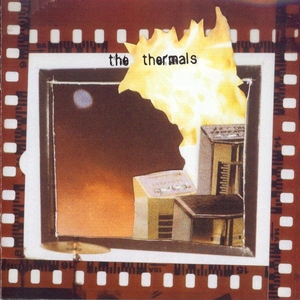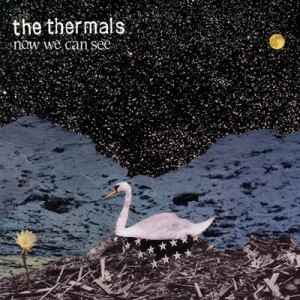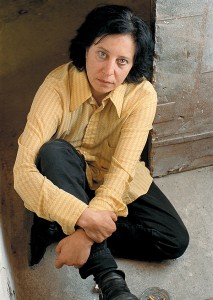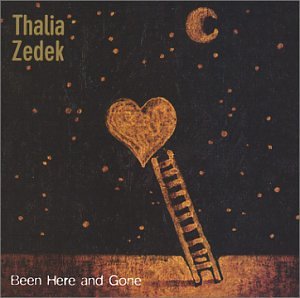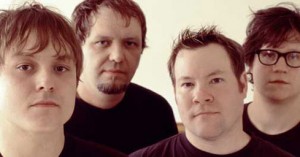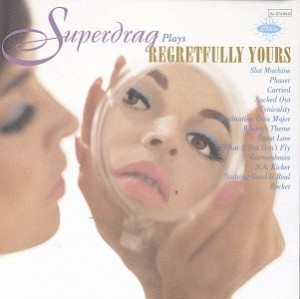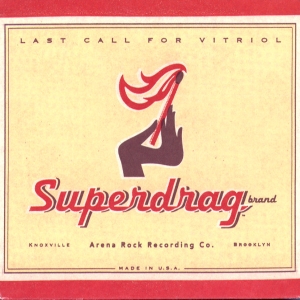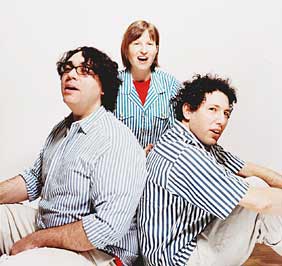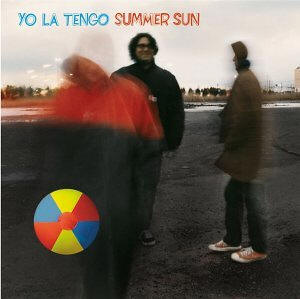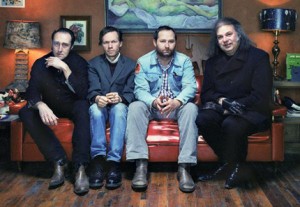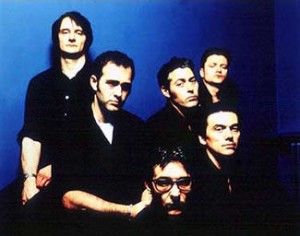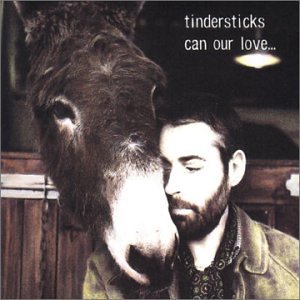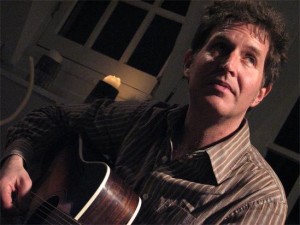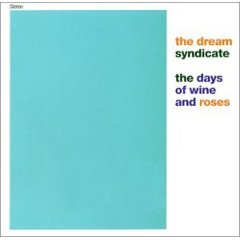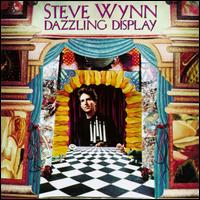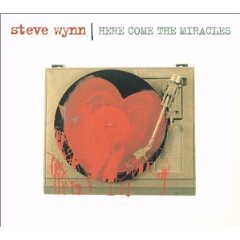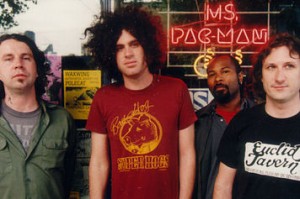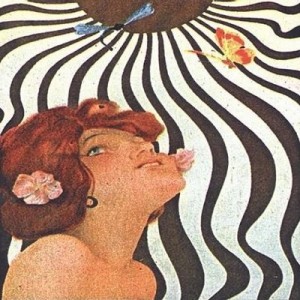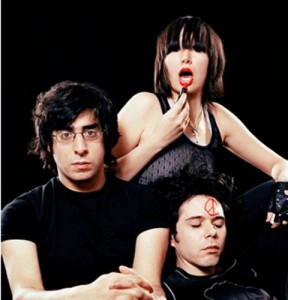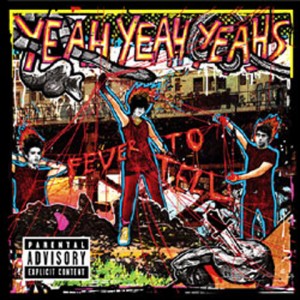FOREWORD: Sam Beam (a.k.a Iron & Wine) began as a nocturnal lo-fi bedroom dabbler and ended up garnering unexpected critical success on a semifamous level. An affable indie folk minimalist utilizing an intimate approach reminiscent of tragic ’70s icon Nick Drake’s haunting acoustic durges, the bearded Floridian is a good-natured soul with a great sense of humor as it turns out. Following this ’05 interview promoting the Woman King EP, Iron & Wine went on to record ’07s poignant symphonic masterpeice, The Shepherd’s Dog. In ’09, he dropped the two-disc live/ rarities collection, Around The Well. This article originally appeared in Aquarian Weekly.
Now living in Miami with a wife and three kids, heavily bearded troubadour Sam Beam attended Florida State, taught cinematography, and only strummed guitar as a hobby before reluctantly deciding to share his tenderly sublime musings under the incongruent guise, Iron & Wine.
Remarkably, the cordial slack-drawled Columbia, South Carolina, native hadn’t attempted to record his wispy minimalist folk-rooted incantations ‘til age twenty-one. Peculiarly signed to hallowed Seattle label, Sub Pop, an affluent indie better known for exposing clamorous grunge acts, Iron & Wine continues to gain acceptance among awed admirers, ushering comparisons to the abstruse fatalism Nick Drake and Elliott Smith’s vivid melodic wordplay and somber twilight laments once projected.
Yet despite a penchant for mortality yarns, the relaxed, easygoing Beam harbors no disturbingly extant death wish. Instead, his earnest postcards from the edge and sedate acoustical trinkets transport sullenly restrained lyricism to majestic heights, contentedly expressing delicately mesmerizing serenity, beautifully hypnotic imagery, and ephemeral tropical splendor while avoiding descent into the dire disconsolateness, destitute delusions, and downbeat dissuasions depressing the above mentioned suicide coalition. Though casting similar vulnerability, Beam’s conventional lifestyle and lyrical apparitions appear to be more grounded and centered.
On Iron & Wine’s highly regarded, preposterously titled ’02 debut, The Creek Drank the Cradle, the one-man bands’ formative homespun hushed lullabies arrive pure as the driven snow. Beam’s gentle slide guitar earthiness and subtle 6-string phrasing surround his seductively poignant eggshell-soft whispers and breathlessly flinty coos, genuinely evoking a warm summer breeze blowing jasmine through your mind. 
At this precocious juncture, Beam’s intimately economical, plainly detailed elocution proffers deliberately constraint succinctness, taking no chances getting across uncomplicated chord structures to accompany his ethereal beatnik folk informalities. Rural railroad regalia “The Rooster Moans” retains an uncanny post-war folk-Blues authenticity not far removed from the slivery banjo-soaked Piedmont Blues consuming sighed vignette “An Angry Blade.” More often, Beam’s exquisite dewy-eyed meditations hinge on the slowly swaying understated pop tranquility these tidily modest inaugural hymns deserve.
After ‘03s interim EP, The Sea & The Rhythm, Iron & Wine returned with the autumnal melancholic masterwork, Our Endless Numbered Days (infrequently supplemented by sister Sara’s high-pitched harmonies). Gaining greater confidence while moving away from the hyper-precise reverent treatments of his valiant initial entree, Beam now ably displays effortless assurance delivering stunning elliptical impressionism.
The dusky tribal rhythm subsuming the hauntingly ticking “On Your Wings” recalls mentor Tom Waits’ bedeviled dead of night dirges. Spindly manifesto “Naked As We Come” and ominously hummed zephyr “Cinder And Smoke” have a woodsy feel the pristine campfire sonnet “Sunset Soon Forgotten” and dulcet murmur “Love And Some Verses” preserve. On the folk-Blues tip, the banjo-slide slither “Teeth In The Grass” and old timey ukulele desolation “Radio War” suffice. Embracing neo-Classical ripple “Each Coming Night” recalls Simon & Garfunkle’s “The Boxer” or, perhaps, the eternal duo’s surreal demure canticle “Scarborough Fair.”
 On ‘05s magnificent 6-song EP, Woman King, Beam’s most varied project thus far, he uses hip historic independent women as storied metaphors for intriguing euphonies and also delightedly widens the instrumental expanse a tad. Lubricious violin eventually contrasts the satiny tenor-bound whisk “Gray Stables,” harpsichord tingles the antediluvian dissent “Jezebel,” and a fuzzy electric guitar midst amplifies the circularly designed “Evening On The Ground.” Trickled tambourine pacifies the foreboding piano-sketched tale “My Lady’s House.” “Freedom Hangs Like Heaven” drifts safely into elegiac Appalachian territory. The title track, a spruced mantra underscored by clickety percussion, brings stately bottleneck guitar to a nearly exotic glisten, summoning the gingerly transience of mod bard Mark Eitzel.
On ‘05s magnificent 6-song EP, Woman King, Beam’s most varied project thus far, he uses hip historic independent women as storied metaphors for intriguing euphonies and also delightedly widens the instrumental expanse a tad. Lubricious violin eventually contrasts the satiny tenor-bound whisk “Gray Stables,” harpsichord tingles the antediluvian dissent “Jezebel,” and a fuzzy electric guitar midst amplifies the circularly designed “Evening On The Ground.” Trickled tambourine pacifies the foreboding piano-sketched tale “My Lady’s House.” “Freedom Hangs Like Heaven” drifts safely into elegiac Appalachian territory. The title track, a spruced mantra underscored by clickety percussion, brings stately bottleneck guitar to a nearly exotic glisten, summoning the gingerly transience of mod bard Mark Eitzel.
A soon-to-be-released EP utilizing ubiquitous Tucson mavericks Calexico, will revisit some of Beam’s oldest songs, written prior to his debut.
“It’s a collaboration in the truest sense of the word,” Beam concludes. “It’ll have a slight Mexicali bent.”
Were you aware of or encouraged by intuitive lo-fi bedroom recorders such as Liz Phair and Sebadoh when you began privately recording your own stuff in the late ‘90s?
SAM BEAM: I was, but only peripherally. I didn’t hear much of it. But I listen to lots of music and knew it was out and about. I was into heavier stuff like Nirvana when they came out. My tastes are all over the place. I thought what Sub Pop was doing was great. I was into skate punk then. I was in school at Richmond, Virginia so nearby DC punk by Fugazi influenced me.
Over the course of a few albums and EP’s, you’ve opened up your arrangements slightly while retaining allegoric compositional depth.
For variety’s sake, as well as for this recent record, we went to the studio and tried to change the sound a little and make it more playful to keep things interesting for myself and the audience.
“Evening On the Ground” is subtitled “Lilith’s Song.” Why?
Lilith is from Jewish mythology. She was the first wife of Adam cast out of Eden because she wouldn’t let Adam lie on top of her. She wanted to fuck him on top. So he got rid of her and got Eve, who was more compliant. The whole Lilith Fair concert series is based on that character.
“Jezebel” is somewhat based on a shameless Biblical matron, too.
She was the most wicked queen of Israel. She made her husband, who was king, worship idols instead of God. They eventually killed her.
Are you a spiritual person?
No. But I’m interested in watching the news. There are plenty of topics of interest. And if you spend time in the Carolinas you’ll get affected by religion, either positively or negatively and how it plays itself out with people.
Much like contemporaries Okkervil River, mortality plays an important part in your music. But it’s never done in a gruesome manner like, say, Nick Cave’s darkest material.
I’m definitely into mortality, but not in the morbid sense. Woman King’s songs are based on strong female characters I was drawn to while writing narrative stories. The historical content is merely a reference point for the audience to pick up on but at the same time, it’s not really about those historic figures.
On Our Endless Numbered Days, you seemingly stepped beyond mythical, transitory, and romantic boundaries for the portentous sociopolitical assertion “Free Until They Cut Me Down.”
Totally. I tasted societal mores. (laughter) It’s about a character who knows he’s done something that’s not right, but doesn’t want to fess up to it. He urges his father, ‘don’t tell me what to do,’ but knows he’s gonna have to pay for it down the road.
Are you into old Blues artists, such as Elmore James, who I thought might’ve affected your slide guitar playing?
Elmore’s great. All those old Blues guys were amazing. I listen to African, Balinese, and Classical music. It’s a big world with a lot of different kinds of music.
Will you ever change direction and make a loud, rocking record with angular guitars spewing hefty wattage?
I wouldn’t rule anything out if the song calls for that. But I’m not gonna write a rocking jam record just for the sake of it. There’ll just be a sensible evolution. Through the process of writing, you find out how to make the songs work.
Where does the paradoxical Iron & Wine moniker come from? Does it contrast a heretofore-unforeseen metallic thickness hedging against the soothing vinous warmth of your songs?
Well. Iron Maiden. That’s where it came from as inspiration. No. I’m just kidding. I thought it was more interesting than my name. It’s showmanship. Which is more interesting, that or Sam Beam?

